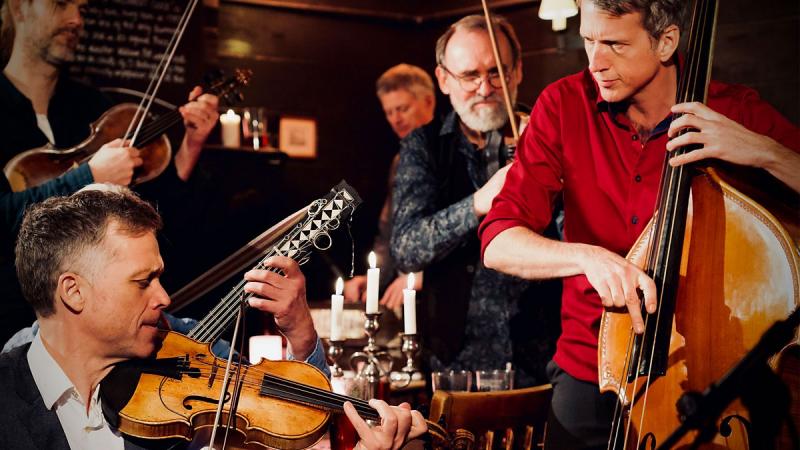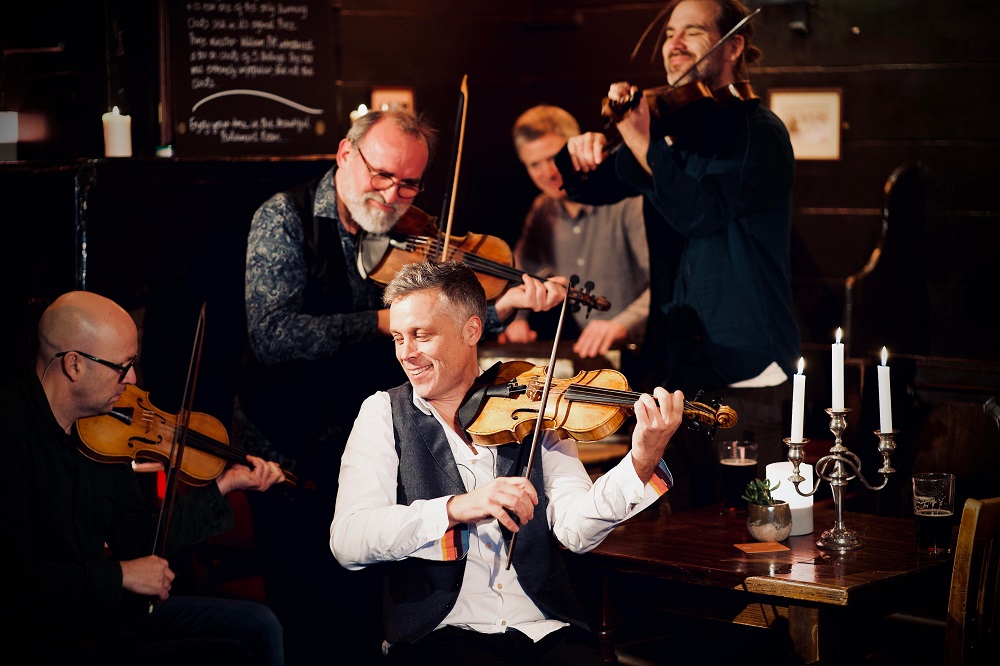First Person: violinist and animateur Bjarte Eike on filming the celebrated Alehouse Sessions | reviews, news & interviews
First Person: violinist and animateur Bjarte Eike on filming the celebrated Alehouse Sessions
First Person: violinist and animateur Bjarte Eike on filming the celebrated Alehouse Sessions
Barokksolistene's mover and shaker on the thinking behind his group's 'old pop music'

BBC Four is broadcasting our Alehouse Sessions which filmmaker Dominic Best filmed in Battersea Arts Centre one snowy night in December. I know it feels very unlikely that we, the Barokksolistene, a Scandi group of baroque specialists, have made a programme for British TV singing sea shanties and folk ballads alongside Purcell.
In fact, we are recreating the anarchic spirit of Oliver Cromwell’s lockdown London when the theatres and playhouses were shut down by the Puritans and the musicians surreptitiously crept into the backrooms of alehouses and inns in protest.
Nothing about the Alehouse Sessions is what one expects from a baroque music concert. I try to explain that it’s just old pop music. In fact, how we chose our colleagues in the Barokksolistene is as much about their other interests as it is playing baroque music. I want this band to resemble the mentality of a pop group; from my little black book, an extensive collection of songs and dance music – four hours of music – I only announce to the musicians half an hour before we go on stage which ones we are about to perform. This means we really want the unexpected to happen because it brings a refreshing air of spontaneity to our performances and audiences love it. No two Alehouses are the same. We genuinely surprise the audience because we surprise ourselves.
I realise that this takes a particular kind of musician prepared to enjoy mistakes and turn them into opportunities for humour, to spark new ideas and to improvise. The mistakes make it human and keep it real. It’s the complete opposite of what every classically trained musician is taught at college or conservatoire.  Everyone in the Barokksolistene is expected to sing, dance, move, play multiple instruments and generally have fun. Flexibility is key. All of us have another string to our bow. Hans Knut Sveen plays anything from harpsichord to harmonium; Frederik Bock plays any kind of continuo – guitar, lute, theorbo and any style up to blue grass; Johannes Lundberg’s roots are in jazz; Milos Valent is one of the greatest Slovak folk string players; Per Buhre is a countertenor and cider-maker extraordinaire; Helge Andreas Norbakken plays all sorts of percussion and drives steam locomotives; Tom Guthrie is a stage director and vocal entrepreneur; Steven Player is our unstoppable pony-tailed dancing Romeo; and I have found a new thrill in jumping out of aeroplanes and teaching yoga.
Everyone in the Barokksolistene is expected to sing, dance, move, play multiple instruments and generally have fun. Flexibility is key. All of us have another string to our bow. Hans Knut Sveen plays anything from harpsichord to harmonium; Frederik Bock plays any kind of continuo – guitar, lute, theorbo and any style up to blue grass; Johannes Lundberg’s roots are in jazz; Milos Valent is one of the greatest Slovak folk string players; Per Buhre is a countertenor and cider-maker extraordinaire; Helge Andreas Norbakken plays all sorts of percussion and drives steam locomotives; Tom Guthrie is a stage director and vocal entrepreneur; Steven Player is our unstoppable pony-tailed dancing Romeo; and I have found a new thrill in jumping out of aeroplanes and teaching yoga.
Of course, all baroque music requires a degree of improvisation – whether secular or ceremonial music. Ornamentation and embellishments are an irresistible part of Handel’s and Purcell’s arias. Some years ago, I came across Playford’s book of dance tunes – most of these have just a line of melody faintly sketched out. The rest – harmony, rhythm combination of instruments – is completely for us to reimagine, and it’s so liberating. It is the opposite of the ceremonial or court music of the day. This was the popular music of the streets and taverns where artistic freedom was paramount so that musicians would be free to respond and change to whatever audience might be at hand.
Watch the trailer for the BBC Four documentary
Discovering Playford’s collection made me want to explore further books on English drinking establishments. Above all I just knew that if we were going to play this kind of English music, we had to take it back to where it was performed. The public house is such an integral part of English culture – its neutral ground, regardless of age or sex – it’s a place to escape reality where chatting and gossiping thrives.
Leap forward to those days in December 2022, and we find ourselves sitting around a table, drinking beer, gossiping and playing music at London’s 17th Century George Inn. The melodies are from the above mentioned collections like Playford, but it is our very own take on this music – and, it is in front of a camera. Cut scene, and we move into the “back room” of the pub (which is really a stage at the Battersea Arts Centre), we’re on stage in front of a very enthusiastic, diverse audience who’s joining in singing, laughing and dancing. I feel lucky, blessed and quite humbled that I get to present this wonderful music, together with my wonderful friends, and the crowd and crew behind the cameras really engage in the whole thing... and when I say “it’s just old pop music”, I mean it.
Explore topics
Share this article
The future of Arts Journalism
You can stop theartsdesk.com closing!
We urgently need financing to survive. Our fundraising drive has thus far raised £49,000 but we need to reach £100,000 or we will be forced to close. Please contribute here: https://gofund.me/c3f6033d
And if you can forward this information to anyone who might assist, we’d be grateful.

Subscribe to theartsdesk.com
Thank you for continuing to read our work on theartsdesk.com. For unlimited access to every article in its entirety, including our archive of more than 15,000 pieces, we're asking for £5 per month or £40 per year. We feel it's a very good deal, and hope you do too.
To take a subscription now simply click here.
And if you're looking for that extra gift for a friend or family member, why not treat them to a theartsdesk.com gift subscription?
more Classical music
 Bizet in 150th anniversary year: rich and rare French offerings from Palazzetto Bru Zane
Specialists in French romantic music unveil a treasure trove both live and on disc
Bizet in 150th anniversary year: rich and rare French offerings from Palazzetto Bru Zane
Specialists in French romantic music unveil a treasure trove both live and on disc
 Scottish Chamber Orchestra, Ibragimova, Queen’s Hall, Edinburgh review - rarities, novelties and drumrolls
A pity the SCO didn't pick a better showcase for a shining guest artist
Scottish Chamber Orchestra, Ibragimova, Queen’s Hall, Edinburgh review - rarities, novelties and drumrolls
A pity the SCO didn't pick a better showcase for a shining guest artist
 Kilsby, Parkes, Sinfonia of London, Wilson, Barbican review - string things zing and sing in expert hands
British masterpieces for strings plus other-worldly tenor and horn - and a muscular rarity
Kilsby, Parkes, Sinfonia of London, Wilson, Barbican review - string things zing and sing in expert hands
British masterpieces for strings plus other-worldly tenor and horn - and a muscular rarity
 From Historical to Hip-Hop, Classically Black Music Festival, Kings Place review - a cluster of impressive stars for the future
From quasi-Mozartian elegance to the gritty humour of a kitchen inspection
From Historical to Hip-Hop, Classically Black Music Festival, Kings Place review - a cluster of impressive stars for the future
From quasi-Mozartian elegance to the gritty humour of a kitchen inspection
 Shibe, LSO, Adès, Barbican review - gaudy and glorious new music alongside serene Sibelius
Adès’s passion makes persuasive case for the music he loves, both new and old
Shibe, LSO, Adès, Barbican review - gaudy and glorious new music alongside serene Sibelius
Adès’s passion makes persuasive case for the music he loves, both new and old
 Anja Mittermüller, Richard Fu, Wigmore Hall review - a glorious hall debut
The Austrian mezzo shines - at the age of 22
Anja Mittermüller, Richard Fu, Wigmore Hall review - a glorious hall debut
The Austrian mezzo shines - at the age of 22
 First Person: clarinettist Oliver Pashley on the new horizons of The Hermes Experiment's latest album
Compositions by members of this unusual quartet feature for the first time
First Person: clarinettist Oliver Pashley on the new horizons of The Hermes Experiment's latest album
Compositions by members of this unusual quartet feature for the first time
 Gesualdo Passione, Les Arts Florissants, Amala Dior Company, Barbican review - inspired collaboration excavates the music's humanity
At times it was like watching an anarchic religious procession
Gesualdo Passione, Les Arts Florissants, Amala Dior Company, Barbican review - inspired collaboration excavates the music's humanity
At times it was like watching an anarchic religious procession
 Classical CDs: Camels, concrete and cabaret
An influential American composer's 90th birthday box, plus British piano concertos and a father-and-son duo
Classical CDs: Camels, concrete and cabaret
An influential American composer's 90th birthday box, plus British piano concertos and a father-and-son duo
 Cockerham, Manchester Camerata, Sheen, Martin Harris Centre, Manchester review - re-enacting the dawn of modernism
Two UK premieres added to three miniatures from a seminal event of January 1914
Cockerham, Manchester Camerata, Sheen, Martin Harris Centre, Manchester review - re-enacting the dawn of modernism
Two UK premieres added to three miniatures from a seminal event of January 1914
 Kempf, Brno Philharmonic, Davies, Bridgewater Hall, Manchester review - European tradition meets American jazz
Bouncing Czechs enjoy their Gershwin and Brubeck alongside Janáček and Dvořák
Kempf, Brno Philharmonic, Davies, Bridgewater Hall, Manchester review - European tradition meets American jazz
Bouncing Czechs enjoy their Gershwin and Brubeck alongside Janáček and Dvořák
 Solomon, OAE, Butt, QEH review - daft Biblical whitewashing with great choruses
Even a top soprano and mezzo can’t make this Handel paean wholly convincing
Solomon, OAE, Butt, QEH review - daft Biblical whitewashing with great choruses
Even a top soprano and mezzo can’t make this Handel paean wholly convincing

Add comment